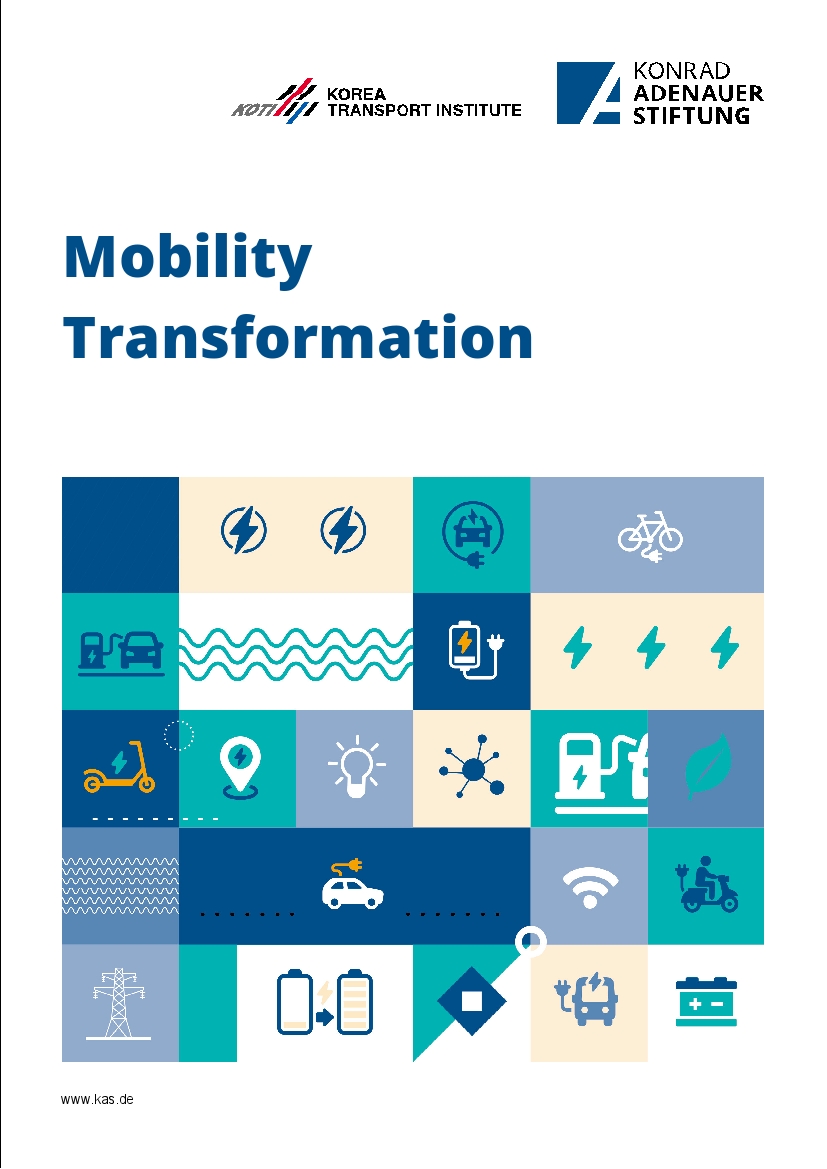Special Report

RESEARCH
KOTI - Korea Transport institute
Mobility Transformation - Introduction
- Date
February 27 2024
- Page(s)
55 page(s)

Mobility Transformation - Introduction
Technology is moving fast and affecting all dimensions of our environment including our perceptions and expectations of how to use and connect space. Both as a product and enabler of these developements, new forms and patterns of movement and transport become possible and desirable. As design and fitst steps of implementation in the process of Mobility Transformation across our countries enter a decisive phase, they become more apparent and tangible for ordinary people and therefore a focus of public debate on defining priorities of our economies and societies alike. We need to address both how to shape the future of mobility as well as how to mitigate risks and concerns accompanying these developments.
This joint publication together with the Korea Transport Institute ( KOTI ) provides an exemplary overview of visions and approaches in Germany and Korea for their respective MobilityTransformation. Both are leading nations when it comes to technological progress as well as necessary legal frameworks in this field, but show complimentary instruments and ideas. Their comparison is meants to illustrate the nexus of pathways leading to a comprehensive and sustainable Mobility Transformation by analyzing specific scenarios or cases, utilizing practical experience and extrapolating methodological models for policy makers in both countries and beyond crafting sustainable mobility transformation strategies in their own context.
 KAS - Mobility Transformation (kasmobilitytransformation.com)
KAS - Mobility Transformation (kasmobilitytransformation.com)
Technology is moving fast and affecting all dimensions of our environment including our perceptions and expectations of how to use and connect space. Both as a product and enabler of these developements, new forms and patterns of movement and transport become possible and desirable. As design and fitst steps of implementation in the process of Mobility Transformation across our countries enter a decisive phase, they become more apparent and tangible for ordinary people and therefore a focus of public debate on defining priorities of our economies and societies alike. We need to address both how to shape the future of mobility as well as how to mitigate risks and concerns accompanying these developments.
This joint publication together with the Korea Transport Institute ( KOTI ) provides an exemplary overview of visions and approaches in Germany and Korea for their respective MobilityTransformation. Both are leading nations when it comes to technological progress as well as necessary legal frameworks in this field, but show complimentary instruments and ideas. Their comparison is meants to illustrate the nexus of pathways leading to a comprehensive and sustainable Mobility Transformation by analyzing specific scenarios or cases, utilizing practical experience and extrapolating methodological models for policy makers in both countries and beyond crafting sustainable mobility transformation strategies in their own context.
Contents
PART 1 02 Foreword
AUTHOR Thomas Yoshimura (Resident Representative in Korea, Konrad-Adenauer-Stiftung)
PART 2 12 The Direction and National Strategies for the Great Mobility Transformation
AUTHOR Dr. Jaehak Oh (President, Korea Transport Institute)
PART 3 28 Transforming Mobility in Germany through the Regional Innovation Cluster “MCube”
AUTHORS Julia Kinigadner (TUM School of Engineering and Design, MCube) Sophia Knopf (TUM School of Social Sciences and Technology, MCube) Oliver May-Beckmann (MCube) Alexander Wentland (TUM School of Social Sciences and Technology, MCube)
PART 1 02 Foreword
AUTHOR Thomas Yoshimura (Resident Representative in Korea, Konrad-Adenauer-Stiftung)
PART 2 12 The Direction and National Strategies for the Great Mobility Transformation
AUTHOR Dr. Jaehak Oh (President, Korea Transport Institute)
PART 3 28 Transforming Mobility in Germany through the Regional Innovation Cluster “MCube”
AUTHORS Julia Kinigadner (TUM School of Engineering and Design, MCube) Sophia Knopf (TUM School of Social Sciences and Technology, MCube) Oliver May-Beckmann (MCube) Alexander Wentland (TUM School of Social Sciences and Technology, MCube)